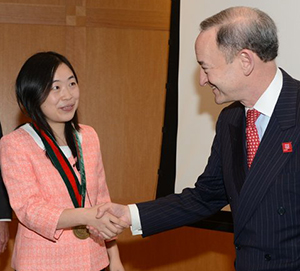
Lan Yang, PhD, has been named the Edward H. and Florence G. Skinner Professor in the Department of Electrical & Systems Engineering at Washington University in St. Louis. She was installed March 16.
Yang is professor in the Department of Electrical & Systems Engineering and heads the Laboratory of Micro/Nano Photonics Research Group in the School of Engineering & Applied Science.
Yang’s research interests include fabrication, characterization and fundamental understanding of advanced nano/micro photonic devices with outstanding optical properties or novel features for unconventional control of light flow.
Her group focuses on the silicon-chip-based, ultra-high-quality micro-resonators and their applications. She and her team have demonstrated the first on-chip micro-resonator-based particle sensors that can achieve not only detection but also size measurement of single nanoparticles one by one. Different materials also are used in her research to achieve advanced micro/nano photonic devices with desired properties, such as nonreciprocal light transmissions in a parity-time-symmetric optical resonator system, an all-optical analog of an electronic diode that allows current flow in one direction.
Most recently, Yang has published results of novel research in the loss-gain phenomenon. She and her team were able to provide new schemes and techniques to engineer a physical system by controlling loss. They took advantage of the loss to reverse the negative effect and produce lasing.
“Lan Yang has had significant accomplishments in her career that have earned her national and international recognition for her cutting-edge research,” said Ralph S. Quatrano, PhD, dean and the Spencer T. Olin Professor. “She is a leader in her field of nanophotonics, and her research will lead to a wide variety of applications in many and varied fields. Her potential to continue to make new discoveries in this area in the coming years is great, and the support of this professorship will help to ensure this outcome.”
In 2010, she earned a National Science Foundation CAREER Award, and in 2011, she was honored by President Barack Obama with a Presidential Early Career Award for Scientists and Engineers (PECASE). The early career award is the highest honor given by the U.S. government to science and engineering professionals in the early stages of their independent research careers.
Yang joined the Washington University faculty in 2007. She earned a doctorate and a master’s degree from California Institute of Technology in 2005 and 2000, respectively; a master’s degree from the University of Science and Technology of China in 1999; and a bachelor’s degree from the University of Science and Technology of China in 1997.
About the Farrow Family
Florence Skinner Farrow established the Edward H. and Florence G. Skinner Professorship in memory of her parents, Edward H. and Florence Garrell Schade Skinner, who graduated from Washington University in 1902 with a degree in civil engineering. At the time, Florence Garrell Schade was said to be the only female civil engineer in St. Louis. She married Edward Skinner, whom she had met at Washington University in 1902. She died in 1906 at age 24.
Edward Skinner, MD, attended Washington University then earned a medical degree from Saint Louis University in 1904. He was a prominent physician in the Kansas City area and served as the first president of the Kansas City Southwest Clinical Society, which he helped found in 1923. He died in 1953.
Farrow earned bachelor’s and master’s degrees in English from Washington University. She was a generous benefactor of local arts and education, including Washington University and the School of Engineering & Applied Science. She also endowed the Joseph H. and Florence S. Farrow Professorship in Biomedical Engineering and the Florence Skinner Farrow Scholarships. She received the School of Engineering Dean’s Medal in 1997 in recognition of her generosity. She died in 1999 at age 93.
About the School of Engineering & Applied Science
The School of Engineering & Applied Science focuses intellectual efforts through a new convergence paradigm and builds on strengths, particularly as applied to medicine and health, energy and environment, entrepreneurship and security.
With 91 tenured/tenure-track and 40 additional full-time faculty, 1,300 undergraduate students, more than 900 graduate students and more than 23,000 alumni, we are working to leverage our partnerships with academic and industry partners — across disciplines and across the world — to contribute to solving the greatest global challenges of the 21st century.